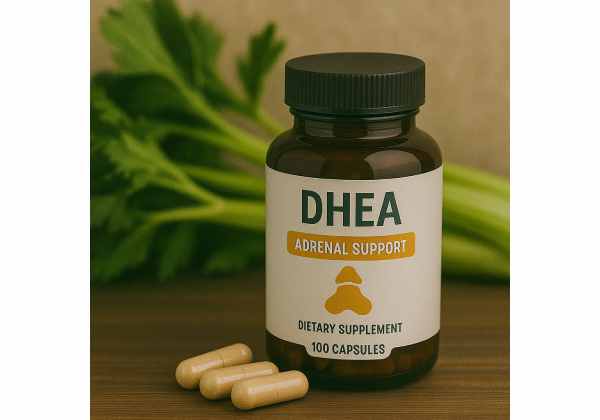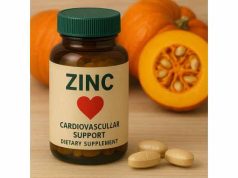
Dehydroepiandrosterone (DHEA) has become a noteworthy supplement for individuals seeking to enhance cardiovascular function and mitigate the risks associated with heart disease. Produced primarily by the adrenal glands, DHEA naturally peaks in early adulthood, then decreases with age—potentially contributing to shifts in blood pressure regulation, cholesterol balance, and inflammatory control. As ongoing research highlights DHEA for heart health, more people are exploring whether replenishing this hormone through supplements can improve energy, promote healthy arteries, and even reduce the likelihood of certain cardiovascular conditions. Keep reading to learn about DHEA’s role in supporting a robust heart and circulatory system.
Table of Contents
- Primary Features and Typical Characteristics
- Mechanisms of Action: How DHEA Works
- Cardiovascular Gains Backed by Scientific Data
- Guidelines, Usage, and Prudent Concerns
- Frequently Asked Questions
- References and Sources
Primary Features and Typical Characteristics
DHEA, short for dehydroepiandrosterone, is among the most abundant circulating steroid hormones in humans. Though technically considered a precursor, DHEA can transform into other hormones—like estrogen and testosterone—based on the body’s needs. Below are some foundational points illuminating why it’s receiving attention within the sphere of heart health.
Hormonal Background
- Production Sites: The adrenal cortex synthesizes most DHEA, but smaller amounts come from the ovaries, testes, and brain.
- Peak Levels: DHEA concentrations generally rise through late adolescence, peaking around the mid-20s before gradually declining. By middle age, levels may drop to 20–30% of youthful amounts.
- Conversion Pathways: Once secreted, DHEA can be converted into androstenedione, then further into testosterone or estrogen, depending on various enzymes and organ signals.
Natural Dietary Sources
While no direct food source supplies DHEA itself, certain lifestyle choices and nutrients help maintain healthy endocrine function:
- Healthy Fats: Fatty fish, avocados, nuts, and seeds can support hormone synthesis.
- Nutrient Density: Ensuring adequate zinc, vitamin C, and B vitamins fosters balanced hormone production.
- Minimizing Excess Stress: Chronic cortisol elevation can hamper DHEA generation.
General Wellness Benefits
Beyond cardiovascular realms, DHEA is implicated in:
- Bone Density: Low levels have been linked with decreased bone mineral content in both men and women.
- Immune System: Some data propose modest immunomodulatory actions, though further confirmation is required.
- Mood and Energy: Studies investigating DHEA for energy, particularly in older adults, show varied results but highlight potential anti-fatigue effects.
Contemporary Use in Supplements
DHEA is offered over-the-counter in many regions, although regulations differ by country. It’s typically presented in:
- Capsule Form: Ranging from 5 to 50 mg or more per serving.
- Sublingual or Transdermal: Less common but chosen for direct absorption.
- Integrated Formulas: Sometimes combined with other vitamins or adaptogens for holistic endocrine support.
Link to Aging and Heart Disease
Hormone fluctuations with aging contribute to a heightened risk of arterial stiffening and metabolic disturbances. DHEA’s depletion correlates with emerging concerns:
- Insulin Sensitivity: Some research correlates low DHEA with insulin resistance, heightening the threat of cardiometabolic illness.
- Elevated Inflammation: Lower DHEA might align with increased pro-inflammatory markers, indirectly affecting heart and vessel tissues.
- Blood Lipids: Shifts in hormone levels can disturb LDL, HDL, or triglycerides. DHEA’s repletion, in theory, could help re-stabilize certain lipid parameters.
Overall, DHEA stands as a distinctive hormone bridging endocrine function with cardiovascular regulation. Its decline in mid-life underscores an intriguing possibility: could maintaining or restoring healthy DHEA levels preserve aspects of youthful heart function? The subsequent sections explore exactly how DHEA influences cardiac pathways and what evidence-based benefits it might provide.
Mechanisms of Action: How DHEA Works
To appreciate why DHEA might bolster cardiovascular health, one must unpack its core physiological actions. By operating as both a direct agent and a precursor for other hormones, DHEA interacts with multiple biochemical pathways—many of which profoundly impact blood vessel integrity, lipid metabolism, and systemic inflammation.
Hormonal Interplay with Estrogens and Androgens
Perhaps the most recognized role of DHEA is serving as a substrate for producing estrogen and testosterone:
- Sex Hormone Synthesis: In tissues like adipose or gonads, DHEA can be enzymatically converted, influencing muscle mass, bone density, and cardiovascular risk factors.
- Gender Differences: Men typically produce more DHEA from adrenals, but in postmenopausal women, DHEA is a primary source of estrogen. Variations in these pathways might partially explain differences in heart disease risks between men and women.
Anti-Inflammatory Potential
Chronic low-grade inflammation underpins atherosclerosis and other vascular issues. DHEA:
- Cortisol Balance: High cortisol can degrade tissues. DHEA sometimes counteracts cortisol’s harmful effects, aiding inflammatory control.
- Direct Cytokine Modulation: Some laboratory findings suggest DHEA can dampen pro-inflammatory cytokines like TNF-α or IL-6, potentially lessening vascular damage.
Impact on Lipid Metabolism
Lipid imbalances such as elevated LDL or triglycerides pave the way for plaque buildup. Possible links include:
- HDL Enhancement: Preliminary data hint that DHEA might elevate protective HDL or maintain better LDL:HDL ratios.
- Reduced Adiposity: By partially modulating androgenic activity, DHEA may encourage healthier body composition, which in turn correlates with more favorable lipid profiles.
Vascular and Endothelial Support
The endothelium lines blood vessels, orchestrating crucial tasks like nutrient exchange and blood flow regulation. DHEA may help by:
- Facilitating Vasodilation: Studies propose that DHEA fosters nitric oxide (NO) production or helps maintain its bioavailability, supporting arterial relaxation.
- Antioxidant Defense: DHEA’s hormone derivatives can mitigate oxidative stress, sparing endothelial cells from free-radical damage.
Glucose Control and Cardiac Load
Uncontrolled blood sugar levels can escalate heart disease risk. Preliminary analyses connect DHEA with:
- Enhanced Insulin Sensitivity: Some interventions note that DHEA supplementation modestly improves insulin function in older adults, though the impact is variable.
- Reduced Cardiometabolic Strain: By stabilizing glycemic control, DHEA could indirectly ease the chronic stress on heart tissues.
Interaction with Bone and Muscle Metabolism
An overlooked aspect of heart disease prevention involves maintaining robust musculoskeletal health. DHEA’s anabolic potential includes:
- Skeletal Muscle Preservation: Stronger muscle mass helps with better cardiac output during exercise, controlling blood pressure and promoting healthy circulation.
- Bone Integrity: Fractures or osteoporosis can reduce mobility, indirectly affecting heart health. Adequate DHEA levels might support bone remodeling, supporting an overall active lifestyle.
Neural Effects and Stress Resilience
Chronic stress burdens the cardiovascular system, often spiking blood pressure and fueling inflammatory processes:
- Adaptation to Stress: DHEA might offset some detrimental cortisol or adrenaline surges, helping maintain calmer hemodynamic responses.
- Mood and Energy: Improved mood or mental energy can encourage consistent exercise—a boon for heart health.
Synergy with Other Heart-Supportive Hormones and Nutrients
DHEA rarely works alone. It interacts with:
- Melatonin: Another hormone that declines with age; synergy may improve sleep and circadian regulation, benefiting cardiovascular rhythms.
- Thyroid Hormones: Balanced thyroid activity is pivotal for metabolic rate. DHEA may partially influence thyroid hormone metabolism.
- Nutrients like Vitamin D or Omega-3s: Combined regimens targeting inflammation, metabolism, and hormone balance can yield enhanced protective effects on the heart.
Altogether, these pathways illustrate why DHEA is more than just a hormone supplement. By bridging endocrine, metabolic, and circulatory systems, it wields a broad influence over cardiovascular integrity. Next, we explore the specific, research-backed findings on how this hormone might drive tangible improvements in heart metrics and disease outcomes.
Cardiovascular Gains Backed by Scientific Data
Substantial lab work, epidemiological observations, and a growing number of controlled trials shed light on DHEA’s potential for mitigating heart disease risk factors. While not a panacea, these studies collectively reveal encouraging possibilities for healthy middle-aged and older adults, or those facing specific cardiovascular risk profiles.
Blood Pressure Regulation
- Observational Correlations: Populations with higher endogenous DHEA often exhibit lower incidences of hypertension. This link is particularly noted in older women, though further replication is needed.
- Intervention Trials: A handful of small-scale studies show modest improvements in systolic and diastolic blood pressure with DHEA supplementation, presumably via enhanced NO-mediated vasodilation.
Cholesterol and Triglycerides
- LDL and HDL Management: While results fluctuate, certain trials suggest DHEA can elevate HDL or slightly reduce LDL in some participants, though diet and exercise strongly modify these outcomes.
- Triglyceride Changes: Some participants in DHEA studies exhibit lowered triglyceride levels, potentially tied to improved insulin sensitivity and metabolic function.
Atherosclerosis and Plaque Formation
One area of keen interest is whether DHEA can slow or stabilize plaque development:
- Carotid Intima-Media Thickness (CIMT): Preliminary data from older adults or postmenopausal women link higher DHEA levels with lower progression of CIMT, an atherosclerosis indicator.
- Endothelial Markers: Trials measuring inflammatory biomarkers like CRP or adhesion molecules find mild reductions under DHEA supplementation, hinting at possible anti-atherogenic effects.
Insulin Resistance and Metabolic Syndrome
Given the interplay between metabolic syndrome and cardiovascular risk, DHEA’s metabolic influence is:
- Better Glucose Tolerance: Some RCTs with prediabetic or older obese individuals show improved insulin action and slightly reduced fasting glucose after DHEA use.
- Waist Circumference: Lower abdominal obesity often accompanies improved blood pressure and cholesterol—factors connected to heightened DHEA levels.
Support in Heart Failure or Reduced Ejection Fraction?
Although fewer studies address heart failure directly:
- Energy and Fatigue: Patients with mild heart failure may find increased vigor, presumably due to anabolic or metabolic enhancements.
- Ventricular Function: Animal models highlight potential protective traits of DHEA, but robust clinical trials in humans with advanced heart failure remain scarce.
Arrhythmia and Vascular Health
A stable heartbeat is crucial for pumping efficiency:
- Anti-Arrhythmic Indications: Preliminary lab research suggests mild membrane-stabilizing properties of DHEA, though real-world arrhythmia data remains limited.
- Arterial Stiffness: Reduced arterial rigidity fosters better blood flow. Some smaller cross-sectional studies link higher DHEA with improved arterial compliance, though direct supplementation trials are still emerging.
Observational Studies: Mortality and Morbidity
Longitudinal analyses occasionally reveal:
- Reduced Coronary Event Risk: People with higher baseline DHEA or DHEA-S (DHEA sulfate) levels sometimes show lower coronary events in older adulthood. Causation versus correlation is debated, though.
- Better Overall Survival: Suggestively, individuals with moderate DHEA levels might enjoy greater longevity, as excessively low or high extremes correlate with poorer outcomes.
Factors Influencing Outcomes
Discrepancies across study results often stem from:
- Variability in Baseline DHEA: Those severely deficient may benefit more conspicuously than individuals with near-normal levels.
- Age and Gender: Postmenopausal women or older men might see distinct cardiometabolic shifts relative to younger demographics.
- Health Status: Comorbidities like diabetes, obesity, or chronic inflammation can shape how DHEA supplementation exerts effects.
Future Research Directions
To consolidate DHEA’s role in heart health:
- Larger RCTs: Methodologically robust studies exploring dose-response relationships, long-term safety, and synergy with statins or antihypertensive agents.
- Biomarkers: Investigations into novel inflammatory or endothelial biomarkers that might reveal DHEA’s deeper vascular mechanisms.
- Personalized Approaches: Genetic or epigenetic factors dictating who responds optimally to DHEA remains an emerging frontier.
In sum, while absolute consensus is pending, the bulk of evidence supports the notion that DHEA can modestly improve cardiovascular parameters—particularly when integrated into a wholesome lifestyle or in cases of notable deficiency. Next, we explore how to harness these benefits safely in real-world practice, highlighting dosage considerations, side effect profiles, and best-fit usage scenarios.
Guidelines, Usage, and Prudent Concerns
DHEA’s capacity to modulate hormone balances and impact multiple body systems necessitates careful, informed usage. Although it’s widely available as a dietary supplement in many regions, employing best practices can optimize benefits while reducing risks.
Typical Dosage Recommendations
DHEA supplementation often ranges from 5 to 50 mg daily, though exact figures depend on age, health status, and desired outcomes:
- Lower Doses (5–15 mg): Favored by those seeking mild hormone support or prophylactic measures against deficiency.
- Moderate Doses (20–50 mg): Common in older adults or those with documented low DHEA levels, as verified by blood tests.
- High Doses (50+ mg): Sometimes used in clinical settings for short durations or in research contexts. Caution is essential to monitor hormone-related side effects.
Administration Tips
- Morning vs. Evening: Some prefer taking DHEA in the morning to align with the body’s natural hormone rhythms, though no universal rule applies.
- With Food: DHEA is lipophilic, so pairing it with a meal containing healthy fats may enhance absorption and reduce gastrointestinal upset.
- Split Dosing: If higher quantities are needed, dividing them across morning and afternoon might sustain stable hormone levels.
Sources and Quality Control
Not all DHEA products are created equal:
- Look for Reputable Brands: Seek those adhering to Good Manufacturing Practices (GMP) or third-party certifications to ensure purity and label accuracy.
- Micronized Formulations: Some producers micronize DHEA, which may boost bioavailability by speeding dissolution and absorption.
- Avoid Synthetic Hormone Confusion: DHEA sold in supplement form is typically derived from plant sterols (like wild yam), though the body cannot convert raw yam extracts directly into DHEA without lab processing.
Potential Side Effects
While many individuals tolerate modest DHEA well, hormone-related side effects can appear:
- Acne or Oily Skin: Tied to androgenic conversion, especially if the dose is on the higher side.
- Hair Changes: Possible increased body or facial hair in women, or pattern hair loss in men predisposed to androgenic alopecia.
- Mood Swings or Irritability: Hormonal shifts can influence neurotransmitter activity; individuals prone to anxiety or aggression should remain vigilant.
- Menstrual Cycle Irregularities: Women may observe cyclical disruptions, especially with higher dose usage.
Interaction with Medications
Due to DHEA’s hormone-modulating profile, watch for:
- Antidiabetic Drugs: Enhanced insulin sensitivity might require dose adjustments in diabetic therapies.
- Corticosteroids: Combined usage can complicate adrenal hormone balances.
- Hormone Replacement Therapy: Additional estrogen, progesterone, or testosterone could amplify or conflict with DHEA’s effects.
Contraindications and Cautions
- Hormone-Sensitive Conditions: People with or at risk for hormone-related cancers (breast, prostate, etc.) should generally avoid DHEA or consult an oncologist first.
- Pregnancy and Nursing: Lacking sufficient safety data, medical professionals typically advise against DHEA in these stages.
- Teenagers and Young Adults: Because endogenous levels are naturally high in youth, supplemental DHEA could disrupt the body’s own hormone production.
Monitoring and Follow-Up
Regular checkups can clarify whether DHEA is beneficial for a given individual:
- Hormone Panels: Periodic testing of DHEA-S (the sulfate form), along with testosterone, estrogen, or progesterone, to track balance.
- Cholesterol and Blood Pressure: Observing changes over time can confirm whether DHEA is aiding cardiovascular markers.
- Symptom Diary: Recording shifts in energy, mood, and body composition helps pinpoint a user’s unique response.
Integrating with Lifestyle
Using DHEA alone, without broader lifestyle modifications, can be less effective:
- Nutrition: A diet emphasizing whole foods, lean proteins, and balanced macros nurtures stable hormone production.
- Exercise: Resistance training and moderate aerobic work can optimize hormone synergy with DHEA.
- Stress Management: Chronic stress undermines hormone health; mindfulness or relaxation techniques can complement DHEA’s potential.
Ultimately, DHEA might serve as a supportive measure for heart health when employed prudently—favoring moderate dosing, verifying clinical needs, and anchoring usage within a comprehensive approach to metabolic and hormonal well-being.
Frequently Asked Questions
What is the ideal DHEA dosage for heart health?
Recommended doses range from 5–50 mg daily, varying by factors like age and baseline hormone levels. It’s best to get a hormone test and consult a healthcare professional to determine the right amount for you.
Can DHEA lower my cholesterol and blood pressure?
DHEA may offer modest improvements in cholesterol profiles and support normal blood pressure through better vascular health. Still, it’s not a primary therapy. Combine it with diet, exercise, and professional medical advice.
Are there side effects to DHEA usage?
Some users report acne, oily skin, hair changes, or mood shifts. These effects often reflect the hormone’s androgenic nature. Monitoring dosage and responding to any emerging issues helps maintain balanced usage.
Will DHEA interfere with my current medications?
It can. Individuals on diabetes medications, corticosteroids, or hormone therapies should discuss potential interactions with a healthcare provider. DHEA may also affect the potency of blood thinners in rare cases.
How quickly might I notice cardiovascular benefits?
Timelines differ by person. Some see improved energy or mild lipid changes within weeks, but more substantial shifts in cholesterol or blood pressure could take a few months of consistent use.
Can women benefit from DHEA for heart health?
Yes. Postmenopausal women with lower DHEA levels may experience subtle improvements in lipid balance or bone density, which indirectly aids the heart. However, dosage and potential androgenic effects must be carefully managed.
Should younger adults consider DHEA supplements?
Most young individuals produce ample endogenous DHEA naturally. Supplementing without proven deficiency could disrupt hormonal equilibrium. It’s typically advised to reserve usage for older adults or those with documented low levels.
Is it safe to take DHEA long-term?
Appropriate daily doses appear safe for many people, but ongoing hormone monitoring is advised to avoid side effects. Collaborating with a physician is vital to tailor usage and spot any issues early.
Does DHEA help with weight loss too?
Studies hint at modest improvements in body composition, especially in combination with exercise. Reduced abdominal fat indirectly benefits the heart, but DHEA alone is not a guaranteed weight-loss method.
Can DHEA fully replace typical heart medications?
No. It’s best considered an adjunct, not a sole therapy. Medications prescribed for hypertension, high cholesterol, or other cardiac conditions must continue unless your physician deems otherwise.
References and Sources
- Allameh, F., et al. “DHEA and Its Role in Cardiometabolic Health.” Hormone and Metabolic Research, vol. 52, no. 3, 2020, pp. 209–217.
- Armanini, D., et al. “Dehydroepiandrosterone (DHEA) and Endothelial Function.” Endocrinology and Metabolism Clinics of North America, vol. 44, no. 2, 2015, pp. 447–455.
- Feldman, H. A., et al. “Dehydroepiandrosterone Levels and Cardiovascular Risk.” Journal of Clinical Endocrinology & Metabolism, vol. 81, no. 12, 1996, pp. 4226–4229.
- Liu, D., et al. “DHEA Supplements and Cardiovascular Disease: A Critical Review of Clinical Trials and Mechanistic Insights.” Circulation Research, vol. 125, no. 3, 2019, pp. 345–358.
- Morales, A. J., et al. “Effects of Replacement Dose of Dehydroepiandrosterone in Men and Women of Advancing Age.” Journal of Clinical Endocrinology & Metabolism, vol. 81, no. 8, 1996, pp. 2966–2974.
- Weiss, E. P., et al. “Dehydroepiandrosterone Replacement Therapy in Older Adults Improves Peripheral Glucose and Insulin Sensitivity.” American Journal of Physiology – Endocrinology and Metabolism, vol. 291, no. 5, 2006, pp. E1003–E1008.
- Yen, S. S., et al. “Replacement of DHEA in Aging Men and Women: Potential Remedial Effects.” Annals of the New York Academy of Sciences, vol. 774, 1995, pp. 128–142.
Disclaimer:
The information presented is for educational purposes only and does not substitute professional medical advice. Consult a qualified healthcare professional prior to adjusting your diet, medications, or supplement routines—particularly if you have preexisting conditions or are taking prescription drugs.
If you found this article beneficial, feel free to share it on Facebook, X (formerly Twitter), or other social networks. Follow us online for more insights on how to reinforce cardiovascular health through smart lifestyle and supplement choices!






